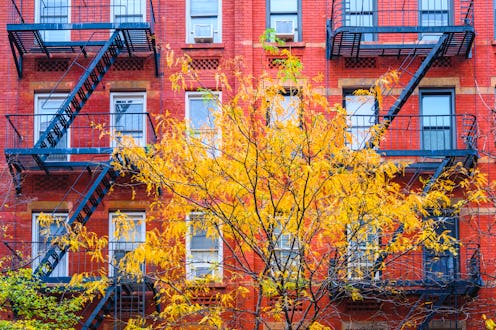Life
The 6 Reasons Why You're More Tired In The Fall (And How To Counteract Them)

Fall is finally here, the most glorious time of year! Leaves are turning, the weather's finally cool enough to break out your favorite sweaters, and indoorsy types such as myself can finally stop pretending we enjoy lounging in the sun. (It's sweaty! There are bugs!) But for some, the changing of the seasons is less pleasant, and can lead to a sudden dip in energy, leading many people to wonder why you get more tired in the fall.
Growing up, fall sluggishness was always attributed to the changing weather. "It's the weather," is something parents and/or school nurses would say dismissively when you came in the room at the beginning of the school year, complaining of drowsiness and a runny nose. And sure, sometimes we were just trying to find an excuse to skip our chemistry test, but that doesn't mean we didn't really feel run down as well.
Though "it's the weather" always seemed like a throw away answer, it turns out there is something to it. But what is it exactly about the changing seasons that makes us feel like we could sleep for a thousand years? Is it something in the air itself? According to Dr. Benjamin Kaplan, an internal-medicine physician at Orlando Health in Florida, the answer is kind of... yes.
"Many studies show that rhinovirus and coronavirus are the two main agents of the common cold," Kaplan told Live Science. "Interestingly, they flourish in cooler weather, such as what we have in spring and fall."
And the cold isn't the only reason you may be feeling run down this fall. Check out some of the other possible explanations below.
Changes in sunlight.
With fall comes cooler weather and shorter days, and the lack of sunlight can have a significant impact on how energetic we feel. As Dr. Michael Howell, a sleep specialist with the University of Minnesota, told his local CBS affiliate, changes in the sunlight create changes in our body’s natural rhythm.
“There’s a special circuit from your eyeball that goes directly to your brain that picks up sunlight, and the most important signal is sunlight in the morning,” he said. “That sunlight in the morning helps wake you up, but helps keep you awake all day long.”
And while you end up going to and from work in the dark, finding ways to get outside during the day and enjoy the sunlight can boost your mood and energy.
Changes in what you eat.
With cooler weather comes heavier, more comforting foods like creamy pastas and warm pies and hearty stews. But as delicious as they may be, these carb and sugar-loaded foods can make you feel drowsy. For more energy, doctors advise eating primarily lean protein, fruits, veggies, and complex carbs like whole wheat whenever possible.
Changes in physical activity.
As I mentioned earlier, one of the best parts of fall is that we can finally stop pretending to be interested in outdoor activities. We can say things like "Oh, I would love to go on a hike with you, but looks like it's about to rain so I guess I'll have to stay in and drink hot cocoa instead! Shoot!" But this drop in activity could also contribute to us feeling more run down.
“Physical activity maintains physical alertness,” said Dr. Howell.
Changes in sleep patterns.
Changes in sleep can have a huge impact on how you feel throughout the day. For some, fall ushers in the beginning of the school year, which means they're shuttling themselves or their children off at a much earlier hour in the morning, and probably getting less sleep.
Others, perhaps tempted to go into hibernation mode, might sleep longer, but sleeping too much can be as detrimental to your energy levels as too little sleep.
Like the rest of the year, experts recommend getting around eight hours of sleep a night, and waking up at the same time ever day so as not to mess with your internal clock.
Seasonal Affective Disorder (SAD).
Too often, Seasonal Affective Disorder, or SAD, is treated as a punchline, but for the estimated 10 million Americans who suffer from it, it's no joke.
According to the Mayo Clinic, SAD is a form of depression that is related to the changes in seasons. And while some suffer depressive episodes during the spring and summer, most experience them during the fall and winter, when their exposure to sunlight is increasingly limited. Symptoms can include irritability, hypertension, a "leaden" feeling in arms and legs, cravings for carb-heavy foods, and feelings of depression.
A chronic condition.
If you feel like your fatigue goes beyond regular seasonal sluggishness, there's a chance you could be struggling with a condition like chronic fatigue syndrome or anemia, both of which could leave you feeling exhausted throughout the year. Make sure to consult a medical professional if you think this could be the case for you.